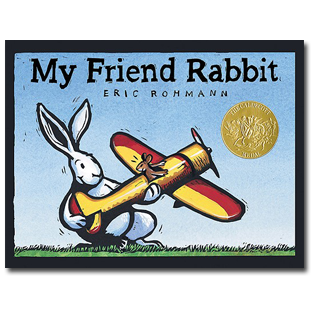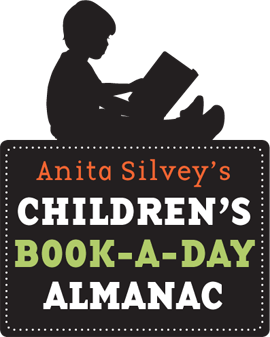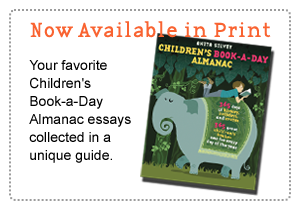
A FEW OTHER EVENTS FOR
JULY 16:
- Happy birthday Arnold Adoff (Black is Brown is Tan), Richard Egielski (Saint Francis and the Wolf), Bobbie Pyron ( A Dog's Way Home ), and Shirley Hughes (Alfie series).
- It’s the birth date of Eve Titus (1922-2002), Anatole series.
- Journalist and newspaper editor Ida B. Wells (1862-1931) was born on this day. Read Ida B. Wells: Mother of the Civil Rights Movement by Judith Bloom Fradin and Dennis Brindell Fradin; Ida B. Wells Let the Truth Be Told by Walter Dean Myers, illustrated by Bonnie Christensen; and Yours For Justice, Ida B. Wells: The Daring Life of a Crusading Journalist by Philip Dray, illustrated by Stephen Alcorn.
- In 1945, the first U.S. atomic bomb test is conducted at Los Alamos, New Mexico. Read The Green Glass Sea by Ellen Klages.
- J. D. Salinger’s Catcher in the Rye was first published on this day in 1951.
July 15–21 has been designated National Rabbit Week to pay tribute to this animal for being such a great companion for humans. What is it about rabbits that so inspire children’s book authors and illustrators? Ever since Peter Rabbit went lippety, lippety down the road, rabbits have multiplied like—well—bunnies in children’s books. I’ll be talking about Beatrix Potter on her birthday later this month. This week I’ll look at some of my favorite rabbit books—Eric Rohmann’s My Friend Rabbit, Robert Lawson’s Rabbit Hill, Shaun Tan’s Lost & Found, Margaret Wise Brown’s Runaway Bunny, and Rosemary Wells’s books about Max the rabbit.
Let’s begin with the Caldecott Winner My Friend Rabbit, a book that works beautifully for the youngest readers ages one through six. Right away on the title page, the tension of the story begins. A large enthusiastic white rabbit stands next to a small mouse, who is seated in an airplane just removed from a beribboned box. Mouse narrates the story: “My friend Rabbit means well. But whatever he does, wherever he goes, trouble follows.” Sometimes authors write pages and chapters to develop narrative tension, but Eric Rohmann launches his story with only a few words. In the art, Rabbit sends his friend airborne, seated like Lindbergh, in his toy.
A true picture book, My Friend Rabbit develops only a fraction of the story in the text—the rest of the action occurs in the hand-colored, strong black outline relief prints that dominate each page. Like a master stage director, Rohmann draws readers across each page and makes them want to turn it to see what happens. In a series of illustrations Rabbit helps his small friend retrieve the plane now stuck in a tree. Commandeering several large animals, Rabbit piles them on top of each other so that Mouse can reach his toy. Pandamonium ensues when the animals crash to earth—“The animals were not happy.” But Rabbit and Mouse go sailing off into the sky . . . until they get stuck once more.
With his glorious images and just a few words, Eric Rohmann allows readers to intelligently predict what will happen next. Randolph Caldecott himself would delight in this energetic and original picture book by one of our most talented author-artists working today. It has even inspired an animated children’s television show based on the characters. Behind the story lies a common dilemma of childhood friendship—what if your slightly larger and older friend has so many good ideas that he or she causes chaos in your life?
Just be prepared, when the story finishes for the child to say, “Let’s read it again.” And again. And again.
Here’s a page from My Friend Rabbit:
Â
Originally posted July 16, 2011. Updated for 2024.














This is a favorite every time I read it with my kindergarten students. I like to use it to help them solidify their understanding of reading and making meaning from illustrations as well as text. I especially like the pages where some of the action occurs right on the edge of the page/off the page and the kiddos have to infer what must be happening. There is so much to learn from this exemplary book! And the idea that sometimes your friends make trouble (without necessarily trying to) is very comprehensible to even the littlest kiddos.